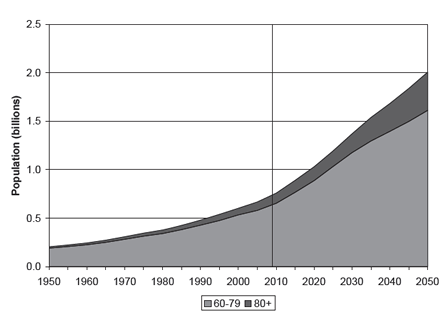Insights · May 5th, 2012
We have known for a long time that the national and global population is aging. It is not that people never lived to be 65 or 75 or 85 in the past, but not such a large portion of a growing global population. Here is a 2009 United Nations chart that illustrates what is coming in the next four decades.

A shift to billions more people over age 65 is dramatic, but it is the numbers for those over age 85 that are the most important story I think. This is because at that age people generally leave their homes and seek alternative housing, have almost certainly stopped driving if they live in a auto-centered country, and both general care and health care needs begin to really increase. There are important social and economic issues created when a quarter of the population is over 65, but these increase dramatically when the cohort reaches 85.
Two recent articles highlight two critical pending issues. The first is that in a nation like the U.S., which is nearly completely dependent on the car for personal transportation, the dilemma of how to balance the desire of elders to stay in their homes and the need to get around when they cannot drive is growing. Florida, which already has 3 million residents over age 65 is confronting the issue now. Will it be expanded transit, or private cabs, or van services provided by institutions like health care facilities that address the need? This is yet to be determined.
A second issue is hunger. The Senior Hunger Report Card, produced by the organization Meals on Wheels Research Foundation, found that hunger in the U.S. for those over age 60 has increased 78% since 2001. Interestingly those most at risk of hunger were those age 60-69, rather than those over age 75, mainly among those earning less than $30,000. Here is the looming challenge. As old-style pensions disappear almost completely for retiring baby boomers, replaced by underfunded, volatile and insecure 401K savings accounts, as home equity returns to earlier levels very slowly, if at all, and as the political system threatens social security at the precise time that taxes ought to be increased not just to stabilize but increase social security, I can see a day coming when legions of elders face real hunger. Something needs to be done to prevent this from happening. The threat is very real.
Glen Hiemstra is a futurist, author, speaker, consultant, Founder of Futurist.com, and founder and Curator of DoTheFuture.com. To arrange for a speech, workshop or consultation contact Futurist.com.

